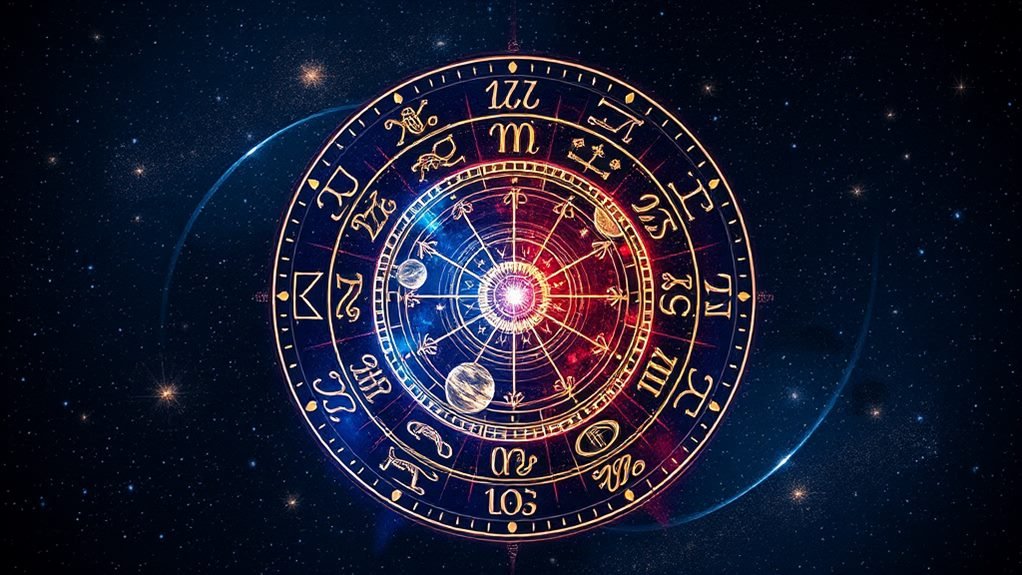Scientists Who Believe In Astrology
The intersection of science and astrology presents a fascinating dialogue that challenges conventional boundaries. While mainstream science dismisses astrology as pseudoscience, some scientists, including the renowned Carl Jung, have explored its symbolic language to gain psychological and cultural insights. This raises intriguing questions about the role of belief systems in scientific inquiry and whether the symbolic nature of astrology can indeed offer valuable perspectives on human behavior. How do these scientists reconcile their empirical training with an interest in astrology, and what implications does this have for our understanding of the human mind?
Key Takeaways
- Carl Jung explored astrology for psychological insights and integrated it into his analytical psychology framework.
- Some scientists study astrology for its cultural and psychological implications rather than empirical validity.
- Historical figures like Ptolemy blended astrological concepts with early scientific methodologies.
- Astrological symbolism is used by some psychologists to understand human behavior and personality.
- Scholars have examined astrology's influence on personal growth and self-awareness, despite scientific criticisms.
Understanding Astrology

Astrology, an ancient practice rooted in the observation of celestial bodies, posits that the positions and movements of stars, planets, and other astronomical phenomena can influence human behavior and earthly events.
It operates through the analysis of birth charts or horoscopes, which map the celestial positions at the exact moment of an individual's birth. This practice encompasses various branches such as natal astrology, which focuses on personal traits, predictive astrology for forecasting future events, and horary astrology for answering specific questions.
The zodiac, divided into twelve signs, plays a pivotal role, with each sign associated with distinct characteristics and tendencies. Astrologers interpret these celestial patterns to provide insights into personality, relationships, and potential future occurrences.
Scientists and Astrology
The intersection of scientific inquiry and astrology evokes a blend of curiosity and skepticism within the academic community. While astrology lacks empirical evidence and is often labeled as pseudoscience, some scientists delve into its study to explore cultural and psychological dimensions. They argue that understanding astrological beliefs can offer insights into human behavior, historical context, and societal trends.
Despite the prevailing skepticism, notable figures such as Carl Jung have shown interest in astrology, suggesting its potential for personal and psychological exploration. However, this interest does not equate to scientific endorsement. Critics maintain that astrology's subjective nature and reliance on vague predictions undermine its credibility. Nonetheless, the dialogue between science and astrology persists, reflecting a complex interplay of belief systems.
Carl Jung's Interest

Among the notable figures who have explored the intersections between astrology and psychology, Carl Jung stands out for his profound interest in astrological concepts. Jung, a pioneering Swiss psychiatrist and psychoanalyst, integrated astrology into his analytical psychology framework. He believed that astrological symbols and archetypes could provide valuable insights into the human psyche.
Jung's fascination with astrology stemmed from his broader interest in mysticism, symbols, and the collective unconscious. He viewed the alignment of celestial bodies as reflective of underlying psychological states and patterns. Jung even used astrological charts to understand his patients better, interpreting them as a means to explore personal and collective unconscious dynamics. His approach bridged the gap between esoteric traditions and modern psychological theory.
Scientific Criticisms
Despite its widespread popularity, scientific criticisms of astrology primarily focus on its lack of empirical evidence and methodological rigor. Critics argue that astrological predictions are often vague and lack the precision required for scientific validation.
Furthermore, studies attempting to test astrological claims have consistently failed to provide reliable, reproducible results. The absence of a plausible mechanism by which celestial bodies could influence human behavior also undermines astrology's credibility.
Additionally, phenomena like the Barnum effect, where people find personal meaning in generalized statements, further question the validity of astrological readings. The reliance on subjective interpretations and the lack of control groups in astrological studies make it difficult to establish any causal relationships, leaving astrology outside the realm of accepted scientific practice.
Astrology as Pseudoscience

Astrology's classification as a pseudoscience stems from its reliance on principles and practices that lack empirical support and scientific rigor. Unlike scientifically validated disciplines, astrology's claims are not substantiated by reproducible experiments or statistically significant data.
Critics argue that its predictions are often vague and rely on subjective interpretation, leading to confirmation bias. Furthermore, astrology lacks a plausible mechanism by which celestial bodies could exert influence over human behavior.
The scientific community generally dismisses astrology due to the absence of consistent evidence and the inability to withstand critical scrutiny. Despite its historical and cultural significance, astrology's methodological shortcomings and reliance on anecdotal evidence solidify its status as a pseudoscience rather than a legitimate field of study.
Confirmation Bias in Astrology
Confirmation bias plays a significant role in the way individuals perceive and validate astrological predictions. This cognitive bias leads people to favor information that confirms their preexisting beliefs while disregarding contradictory evidence.
In the context of astrology, believers often remember accurate or meaningful predictions and overlook the inaccuracies. This selective recall reinforces their faith in astrology, making it appear more reliable than it objectively is.
Furthermore, when individuals encounter ambiguous astrological statements, they tend to interpret them in ways that fit their personal experiences. Such psychological tendencies hinder objective assessment, perpetuating the belief in astrology despite the lack of empirical support.
Consequently, confirmation bias remains a critical factor in understanding the persistence of astrological beliefs among both the general public and some scientists.
The Barnum Effect

Understanding the role of confirmation bias in astrology leads us to another psychological phenomenon, the Barnum effect, which further illuminates why astrological statements often seem personally accurate to individuals. The Barnum effect occurs when people believe vague, general statements apply specifically to them, making astrological predictions appear uniquely tailored.
| Statement Type | Example Statement | Interpretation by Individuals |
|---|---|---|
| Vague | "You have a great need for others to like you." | Seen as highly personal and accurate. |
| General | "You sometimes doubt your decisions." | Considered specific to their situation. |
| Positive | "You have a creative personality." | Embraced as a true reflection of self. |
| Ambiguous | "You will face challenges this year." | Easily adapted to fit future events. |
This cognitive bias contributes to the perceived validity of astrological readings, reinforcing belief in astrology.
Astrology's Cultural Impact
Throughout history, astrology has profoundly influenced various cultures and societies around the world. From ancient Mesopotamia and China to contemporary Western societies, astrology has played a pivotal role in shaping beliefs, traditions, and daily practices.
Astrological charts were often used by rulers for decision-making, while common folk sought guidance in personal matters. The zodiac, with its twelve signs, has permeated artistic expressions, literature, and even medical practices in different eras.
Moreover, astrology's impact is evident in language, with terms like 'mercurial' or 'lunatic' deriving from celestial influences. Despite modern scientific skepticism, astrology's cultural legacy endures, as millions worldwide continue to consult horoscopes and birth charts, illustrating its lasting resonance in human consciousness.
Astrology for Self-Reflection

Astrology serves as a tool for self-reflection, enabling individuals to explore their personality traits, strengths, and potential areas for growth. By examining their astrological charts, individuals can gain insights into their inherent qualities and behavioral tendencies, fostering a deeper understanding of themselves. This introspective process can guide personal development, as people identify specific traits to nurture or transform. Understanding one's astrological profile can also illuminate life patterns and recurring challenges, offering a framework for personal evolution. Below is a table illustrating how different zodiac signs might reflect certain personality traits and growth areas:
| Zodiac Sign | Personality Traits |
|---|---|
| Aries | Leadership, Impulsiveness |
| Taurus | Stability, Stubbornness |
| Gemini | Adaptability, Indecisiveness |
| Cancer | Empathy, Moodiness |
| Leo | Confidence, Arrogance |
This reflective use of astrology can serve as an invaluable tool for personal growth and self-awareness.
Historical Significance
Astrology's utility for self-reflection is deeply rooted in its historical significance, tracing back to ancient civilizations where it played a pivotal role in cultural and scientific developments. For millennia, humans have sought to understand their place in the cosmos through the movements of celestial bodies, intertwining astrology with early astronomy and philosophy. This historical interplay highlights astrology's enduring influence on human thought and societal structures.
- Babylonian Star Charts: Early astronomers meticulously recorded planetary movements, integrating them into their astrological systems.
- Ancient Greek Philosophers: Figures like Ptolemy fused astrological concepts with emerging scientific methodologies.
- Medieval Scholars: Astrology was a cornerstone of medieval medicine and decision-making, permeating various facets of daily life.
These historical milestones underscore astrology's lasting cultural and intellectual legacy.
Conclusion
Astrology, akin to an intricate tapestry, intertwines cultural heritage and psychological exploration, offering a kaleidoscope of insights into the human condition.
Despite scientific criticisms and its classification as pseudoscience, astrology's symbolic language provides a mirror reflecting the depths of the subconscious.
Esteemed thinkers, such as Carl Jung, have navigated its celestial map to uncover profound truths about human behavior, demonstrating astrology's enduring cultural and introspective significance amidst the constellation of belief systems.
🔴 Need Clarity on your Situation?



